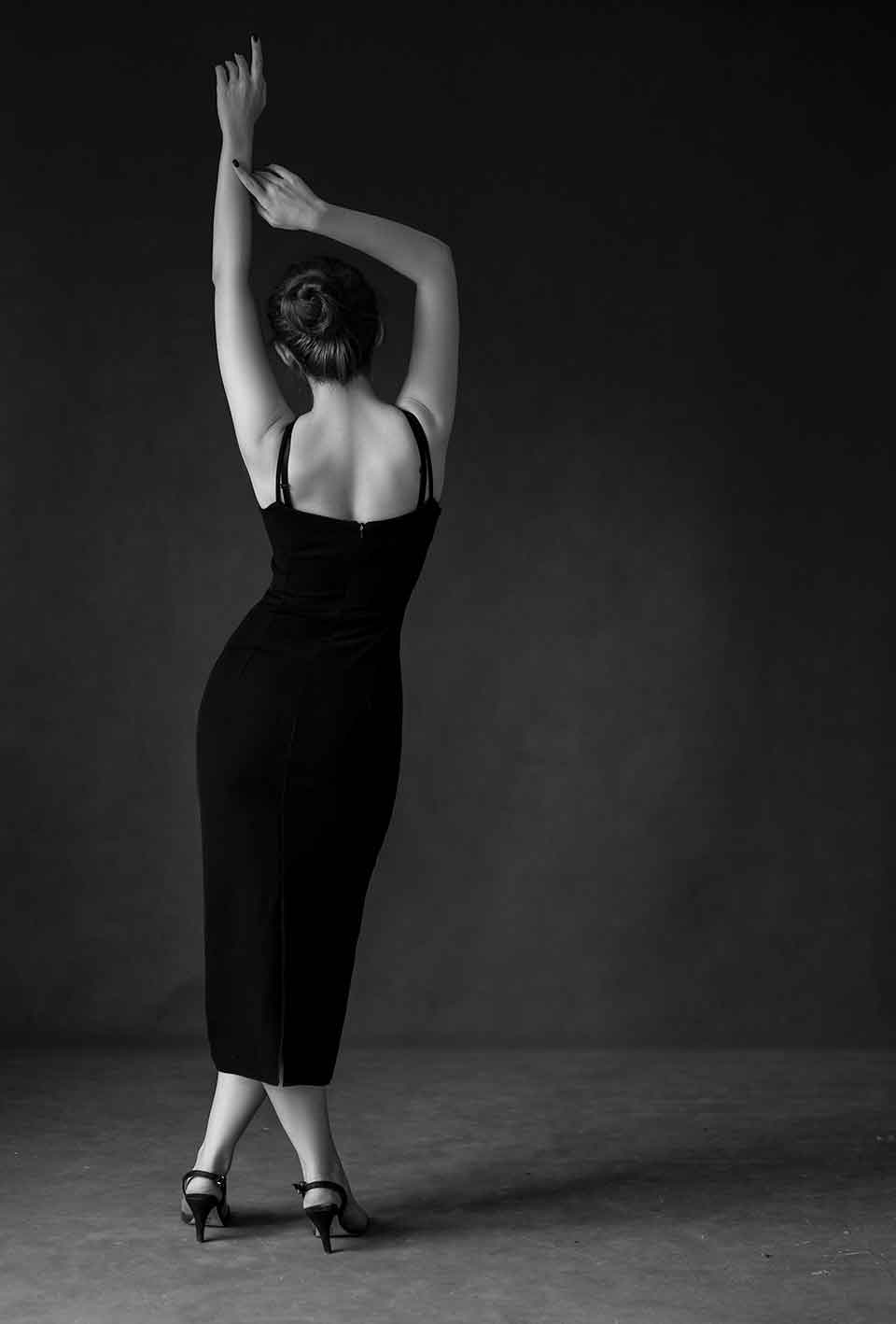She Dances Alone

Narrated by a chorus of male voices, this story recounts the details of an incident that occurred in a company of only male employees, triggered by the entry onstage of a mysterious woman. With its unsettling tone and distinct rhythm, this story is among the best short pieces of noir fiction.
1. The first thing I’d have to say about her is that I barely knew her. Well, actually, these days, who would dare to say that they completely know someone? Who’d put themselves on the line for someone else? I don’t think anyone would. That’s what I think. All we talked about was work. The stuff of day-to-day office life. The routine, which relentlessly carried on, piling up on our desks in paper form: quotes, budgets, sales reports, memos, and so on. 2. You could say she was a good employee. She always arrived at work early and was one of the last to leave. She brought her own food and ate lunch at her desk. Alone. I rarely, if ever—I can’t remember now—saw her chitchatting in the office, and I’d daresay that I never (although “never” is a word that shouldn’t be in the dictionary) saw her “slacking off,” as they say. 3. A woman who was focused on herself. Who didn’t beat around the bush. Who knew what she wanted and kept her feet firmly planted on the pavement. Yes. That’s how I’d describe her. 4. Although she made a very good first impression, after dealing with her you were left with a strange feeling, like disappointment. I don’t know. Not because of something she may have said or done, no. First, because she was a woman of few words, she only said what was needed, and second, because she was very proper. As they say around here: the less you say, the less chance you have of screwing up. 5. It was something else. As if you suddenly found yourself talking, face-to-face, with sadness itself. Yes. That’s it. Sadness embodied in the shape of a woman. 6. Despite everything I’ve said, I wouldn’t be able to list her goals, her objectives. To put down in black and white, on paper, what she hoped to achieve, what she wanted out of life. All I know is that she was passionate about her work. She dedicated herself to it so completely that everything else seemed to take a back seat: her family, her friends. Of course, this is a figure of speech, because I imagine she had family and friends, as everyone does! Even though she didn’t tell me, and I, out of politeness, of course, didn’t ask her. 7. She seemed a bit arrogant to me. With her high heels and nylon stockings, her impeccable suits, her Chanel, her up-do. I felt she was looking down on me. I know she was very tall, almost six foot, and I’m a short-ass at barely five-five. But it wasn’t about physical height, if you know what I mean. I think, at the end of the day, she felt like she was better than us. Superior. Because she’d managed to come into an environment that, until then, had been off-limits to women, the exclusive domain of men. 8. All I’ll say about her is that she was neurotic. That’s all I’ll say. 9. She was very smart. As smart, or smarter, than her older male colleagues. I think this might have put some of them on the back foot, and this gradually undermined the foundation of a relationship that might have become fraternal, if she’d been a man, of course, instead of what she was. 10. They tried to have minimal contact with her, although most of them, at the mere sight of her, drooled and who knows what else under their clothes. She was completely unfazed. 11. I’d say she was a woman who was cold, or insensitive, or frigid, or had simply learned how to deal with those Selenites. 12. Before she came along, the atmosphere was nice and relaxed. A real sense of camaraderie, you might even say. 13. Then all hell broke loose, I’m telling you. Everyone launched into some kind of deranged, unhealthy competition. At first the bosses were pleased because they saw the numbers trending upward. However, some of us suspected that it wouldn’t end well. It couldn’t end well. 14. I was one of the few who dared to say something to the supervisor. I said, “Sir, this is unnatural. It doesn’t feel right. Before she came along, we all worked as a team, but here we are, seven months later, and nobody even wants to help his former colleagues, the ones who were friends until very recently.” He called me by my name and added that, if I wanted to make friends, I should go and have a few drinks at El Greco’s. People were here to work, and that was the end of it. Things would carry on as they were because they were going the way they should. That’s what he said. 15. I’m not sure if she was throwing down the gauntlet to us. I don’t know. I really don’t. All I’ll say is that around that time, I snapped out of it and said to myself, What’s the matter with you, buddy? You’re not going to get left behind while she does her thing, are you? I got my act together and threw myself into work, trying to outdo her, although to be honest with you (what’s the use of lying to ourselves at this point?), she was really good at what she did. 16. Some people said that the bosses favored her. I didn’t agree with that bullshit. Sorry, I mean those opinions. All the bosses cared about were the numbers. And she did her thing. Boy, did she do her thing! It really spurred the rest of us on. Later, things took a different direction, a different path, but that’s a whole other kettle of fish. It was our fault, I think. Not hers. 17. I won’t deny that I was a little uncomfortable, very uncomfortable in fact, with the way she acted, the way she behaved. Admittedly, we weren’t used to having a woman wandering around the office, not even as part of the cleaning staff. Because by the time they showed up to do their work, we were already on our way out. 18. Yes, the atmosphere definitely changed. We had to hold back on a lot of things we did when the office was just full of men, you know. What things? Well. I don’t know. So many things. Like talking about women. 19. Those of us who’d been there the longest, we had a meeting with the supervisor and raised the issue of having a woman in the office. We don’t have anything against her, we told him. How can we have something against her if we barely know her? But we reckon she’s going to cause problems. That’s what we told the supervisor. 20. I just told them: let’s give it a while, guys. I mean, we’re living in different times, for crying out loud. Things have changed. Let’s give her a chance. She deserves it. We all do. Time will tell. That’s what I told them. 21. I don’t think she gave herself a chance to become part of the group. Okay, so maybe some of them pulled a face whenever she approached them, or asked them for help, or just for their opinion on something. I’m not denying that. But some of us were more amenable. Several times we invited her out to El Greco’s with us. To have a few drinks and a chat. To blow off some steam, you know, hell, like the rest of us did! But she always had some excuse, something more important to do. 22. She was very young. I think that might have played a part in what happened. I don’t know how old she was, but I wouldn’t reckon over thirty. And she was doing her best to look older. You could see that. I guess she thought that being a woman was enough of a disadvantage already—I mean in that environment, of course—without people fixating on her age too. 23. I wouldn’t dare blame it on her age. There were other guys working there, other young men, including me. Yes, there were only a few of us younger ones.. No more than three or four. Including her. However, what happened, you can’t blame it on something foolish you do at a certain age. At that age, people do a lot of foolish things. It’s true. But believe me, this wasn’t age-related foolishness. 24. What happened was really complicated. It affected us all. Some more than others, but I think that we all got our just deserts in the end. I changed companies as a result of it. And others followed suit. At different times, of course. You’d have to have real balls to stay in that office after what happened. Or be totally cynical. Or morbid. I don’t know. You’d have to ask the ones that are still there. If there’s anyone left from that time, that is. 25. I think we were all caught up in a whirlwind and nobody had realized. Not even her. Everything was so violently fast-paced. Seriously. No one realized. 26. I disagree. Of course, some of us suspected that things weren’t quite right. Despite the numbers. Despite how pleased the bosses and the parent company were. You could smell it; you could feel it in the air. What we couldn’t imagine was how it would all end. That outcome. And who could’ve done it. It required a grubby little mind. Could you have imagined that? 27. Why do I think what happened, happened? Oh, I don’t know. The truth is, the absolute truth, I haven’t got the faintest idea. And let’s hope I never do. 28. Do I believe in fate? Well, when I was young, I did some acting. Amateur theater, of course. We did adaptations of several of the Greek classics. The tragedies of Sophocles, Euripides, Aeschylus. A good friend and I worked on the texts. You asked me if I believed in fate, and I say to you, like the Greeks, fate is written and nobody can change it, no matter how hard the little people try. 29. What happened, happened, and for me it’s been buried. And I admit that I’m the kind of person who doesn’t like to spend his life raking up the past. 30. I read an article recently called “The Usefulness of the Past.” Ironically, it was written by a woman. Very revealing. In it, she talked about the need to look at our past from time to time, compare it with our present, so we can assess how much our tastes and beliefs have changed over the years. Believe me, when I look back at my past now, particularly at the time when all that went on, I can’t help feeling deeply ashamed. 31. I don’t want to talk about what happened. I think that story’s been reported enough by the press. Flogged to death, I’d say. Especially in the papers. Instead, let me tell you a story about a moment I had with her, or rather, because of her. We were at El Greco’s, one of the few times (or the only time, perhaps, my memory’s not as reliable as it used to be) she agreed to come with us: me and two other colleagues from the office. The four of us were sitting at one of the tables at the back. We ordered beers. And some snacks. We talked about work. It was the only thing she was interested in talking about. With us at least. After a few hours, loosened up by the booze and the music, I tried to steer the conversation toward personal matters. It worked with my two friends, but not with her. Every time we tried to find out anything about her life, she was never snippy or rude, but she gave us a little smile and always avoided it by changing the subject. I didn’t want to be annoying, so I didn’t press her. Neither did the other two. After a while, my colleagues said goodbye, and I was left alone with her. Suddenly we fell silent, saying nothing, just watching the dance floor, or rather, watching the people dancing on it. “Life is one big dance floor, and everyone does the best they can, or makes up their own moves,” she said abruptly, when I was least expecting it. Even though I couldn’t (can’t) dance, and I don’t like music very much, I must say, I knew what she meant. Then I got up and went to the bathroom, I think. When I came back, I saw her dancing, without a partner, on the dance floor. She looked spectacular I swear. Two or three guys approached her at various points to try and get her attention, but she didn’t even bat an eyelid. So as not to look like idiots, the guys decided, at various points, to turn and vanish in the direction they came from. One of them walked past me and whispered in my ear, “Your girl’s waiting for you on the dancefloor.” I grabbed his arm almost violently. Looking him right in the eye, I said to him, “She dances alone.”
Translation from the Spanish
Editorial note: This story won first prize in the fifth edition of the “Stories of Women” Short Story Competition, Spanish-language category, organized by the city council of Santurtzi, Bizkaia, Spain, in 2004. It is part of the short-story collection Mensajes en la pared (2006). English translation copyright © 2021 by Charlotte Coombe.












